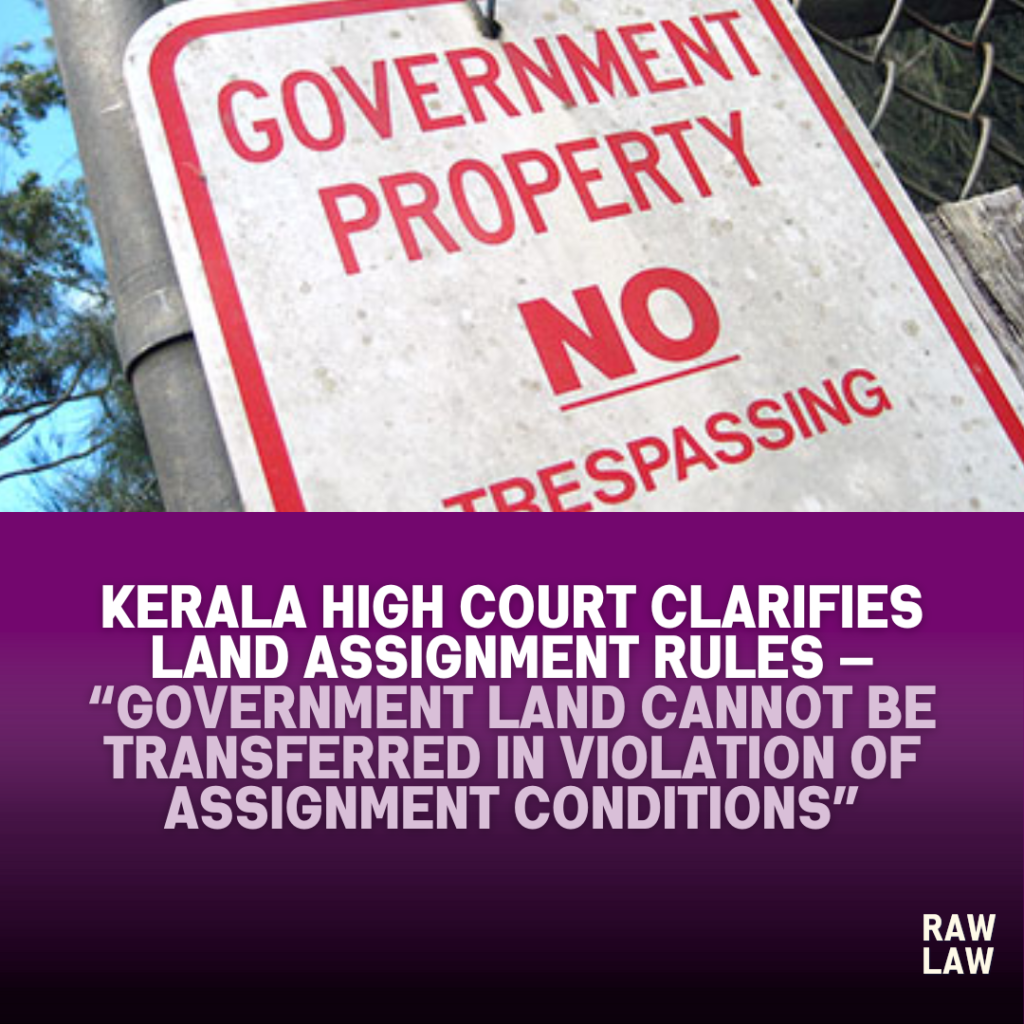Court’s Decision
The Kerala High Court dismissed the writ petition challenging the government’s action in resuming land that had been originally assigned under conditional terms. The Court held that the land assignment was subject to specific restrictions, including a prohibition on alienation, and any transfer made in violation of these conditions was void. It reaffirmed that government land assignments are governed by statutory rules, and the State is empowered to resume such property if the assignee breaches the conditions.
Facts
The petitioner claimed ownership and possession over a parcel of land that was originally assigned by the government to another individual under the Kerala Land Assignment Rules. The original assignment carried restrictions, including a prohibition on transfer without prior government permission. The petitioner acquired the property through a subsequent transaction, arguing that he had bona fide purchased it for consideration. However, the government initiated proceedings to resume the land, asserting that the sale violated assignment conditions and was therefore illegal.
The petitioner contended that the property had been in possession of his family for years and that he had made substantial improvements on it. He also claimed that the government’s action amounted to arbitrary deprivation of property without due process.
Issues
- Whether the petitioner’s purchase of land originally assigned under government grant was valid despite a prohibition on alienation.
- Whether the government had the authority to resume such land after the assignee had transferred it in violation of assignment conditions.
- Whether long possession and improvements by the petitioner could confer any legal right over the land.
Petitioner’s Arguments
The petitioner argued that his purchase was genuine, made after paying consideration, and in good faith. He claimed he was unaware of any restrictions at the time of purchase. He further contended that the property had been in his family’s possession for a prolonged period, during which substantial developments were made, thus entitling him to protection under equitable principles.
He also argued that the government had delayed in taking action, and such inaction amounted to waiver or acquiescence. Additionally, he claimed that the rules under which the resumption was ordered did not apply to him as a subsequent transferee.
Respondent’s Arguments
The State submitted that the land in question was government property assigned under the Kerala Land Assignment Rules, which clearly prohibited alienation without prior sanction. Any transfer contrary to this condition was void ab initio. Therefore, the petitioner could not claim better rights than the assignor.
The government asserted that under the rules, breach of assignment conditions automatically entitled the State to resume possession, and no equitable considerations could override statutory provisions. They also pointed out that the petitioner had constructive notice of the restriction since the assignment was a matter of public record.
Analysis of the Law
The Court examined the Kerala Land Assignment Rules, which lay down clear conditions for government land grants, including the prohibition of sale or transfer without prior approval. Rule 7 specifically empowers the State to resume land if conditions are violated. The Court noted that such conditions run with the land and bind all subsequent holders, whether or not they had actual knowledge.
It further observed that under the Transfer of Property Act, a transferee cannot acquire a better title than the transferor. If the original assignee had no right to transfer, the petitioner could not acquire valid ownership.
Precedent Analysis
The Court relied on earlier decisions, including:
- State of Kerala v. P. Kunhiraman – Held that any alienation in violation of assignment conditions is void, and the government is entitled to resume possession.
- Chandran v. State of Kerala – Clarified that even long possession cannot cure an invalid transfer of assigned land.
- Kochu Devassy v. State of Kerala – Established that the prohibition on alienation is enforceable against all subsequent transferees.
These precedents reinforced the principle that statutory restrictions in government grants override equitable claims.
Court’s Reasoning
The Court emphasised that government land assignments are not equivalent to private ownership transfers; they are grants subject to public policy considerations. The prohibition on alienation is intended to ensure that such lands serve the public purpose for which they were allotted. Allowing unauthorised transfers would defeat the very object of the scheme.
It rejected the petitioner’s plea of bona fide purchase, noting that the assignment terms were available in public records and that constructive notice was sufficient. The Court held that possession and improvements made on the land cannot legitimise an unlawful transfer, as statutory rights prevail over equitable considerations.
Conclusion
The Court upheld the government’s decision to resume the land, declaring that the petitioner’s title was invalid as it was derived from an unauthorised transfer. It reiterated that “government land cannot be transferred in violation of assignment conditions” and that such breaches attract automatic resumption under the Kerala Land Assignment Rules. The writ petition was dismissed.
Implications
This ruling reaffirms the State’s authority to enforce conditions attached to government land grants and sends a strong message that unauthorised transfers will not be protected, regardless of long possession or improvements. It underscores that buyers must exercise due diligence when acquiring such properties, as statutory restrictions override equitable claims.
Cases Referred
- State of Kerala v. P. Kunhiraman – Alienation in violation of assignment conditions is void.
- Chandran v. State of Kerala – Long possession cannot cure an invalid transfer.
- Kochu Devassy v. State of Kerala – Prohibition on alienation binds subsequent transferees.
FAQs
1. Can a government-assigned land be sold without permission?
No. Under the Kerala Land Assignment Rules, sale or transfer without prior government approval is prohibited, and any such transfer is void.
2. Does long possession of assigned land give ownership rights?
No. Even decades of possession cannot legalise an invalid transfer that violates assignment conditions.
3. What happens if assignment conditions are breached?
The government has the authority to resume the land immediately under the applicable rules, without compensating the unauthorised transferee.
